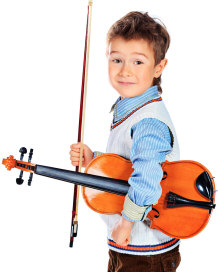The Influence of Music on Children’s Learning

All around the world, music plays major role in culture. Music is
important to people for all different sorts of reasons. Other than its soothing
effect on the soul, researchers have been interested in knowing the role it
plays on learning, especially with children. Scholars, teachers and parents are
concerned with the impact of music on cognitive development. For many, it is
essential in helping the young minds develop memory, perception and language
skills.
There are countless theories and claims about the main factors that affect
the way children learn. Music has been considered one of the most prominent.
Rhymes and sing-songs have been a major part of early education because children
are introduced to basic communication skills, first or second languages, and
other responsive skills. Music is believed to sharpen learning functions
including creativity, and has an intellectually stimulating effect on their
young minds.
The “Mozart Effect”
 The “Mozart Effect” has been popular when associating music with learning.
This refers to claims that listening to the famous musician’s composition
improves overall brain performance. Originating from a study conducted by Shaw,
Rauscher and Ky in 1993 that found Mozart-listening college students score in
spatial intelligence higher than those who do not listen to Mozart. Many started
to believe that certain kinds of music stimulate the brain allowing ideas to
absorb quickly. The “Mozart Effect” has been popular when associating music with learning.
This refers to claims that listening to the famous musician’s composition
improves overall brain performance. Originating from a study conducted by Shaw,
Rauscher and Ky in 1993 that found Mozart-listening college students score in
spatial intelligence higher than those who do not listen to Mozart. Many started
to believe that certain kinds of music stimulate the brain allowing ideas to
absorb quickly.
There is Fun in Music
Along with so many benefits and influence on a child's learning, what makes
music easy to utilize is the fun it brings. When children find enjoyment in what
they get involved in, developing creativity, learning to listen, or adapting a
language is easy to cultivate. With the use of songs, children are reminded of
experiences, persons or events that can help stir a certain feeling they may
need in drawing or scribbling. Additionally, lyrics of these songs are easily
memorized and form part of their vocabulary. For many parents, getting the child
to be interested in music can be the beginning of enjoying the life-long
benefits on learning things easily.
Music Helps Improve Listening
 With their brains considered spongy, children are generally curious and learn
whatever they heard. When exposed to songs, children pay attention to the words
uttered in order to sing along the next time they encounter the music. When
parents habitually play rhymes and songs, kids are likely to pick up the words
they get to hear regularly. They might even surprise you, being able to repeat
phrases and mimic some words from the lyrics. With them getting the words
without being taught meant they have acquired a certain level of listening
skills they needed more when they become adults. With their brains considered spongy, children are generally curious and learn
whatever they heard. When exposed to songs, children pay attention to the words
uttered in order to sing along the next time they encounter the music. When
parents habitually play rhymes and songs, kids are likely to pick up the words
they get to hear regularly. They might even surprise you, being able to repeat
phrases and mimic some words from the lyrics. With them getting the words
without being taught meant they have acquired a certain level of listening
skills they needed more when they become adults.
Music Helps Extend Attention Span
Rhymes and songs kids have picked up from CDs or DVDs parents play, catches
their attention and thus stimulates listening. With their desire to learn words
or phrases or even a melody, they are likely to pay attention more. In addition,
music is known to create a calming effect and thus reduce the motor activity.
With this, it is easier to keep the child’s attention on reading or learning
skills you may deem necessary. When there is a soothing sound played, children
are likely to focus.

Remember, though, that you should determine the child’s
preference for music to achieve this effect. Mood or even time of the day may
dictate the kind of music to be used. Your child’s increased attention and focus
will play great role in many aspects of his life.
Music Can Serve as Memory Exercise
 When listening to music, the side of the brain which handles our long-term
memory is stimulated. With it comes the possibility of having a quicker access
to learned information when needed. Children soon learn the songs and are able
to complete the next stanzas or melodies on their own. Performing music has been
proven to increase linguistic skills and boost memory. Like the sense of smell,
music can help children establish associations with people they have met, and
memories they treasure. You can get started teaching your child memory
skills with learning music notes easily with this simple ebook. When listening to music, the side of the brain which handles our long-term
memory is stimulated. With it comes the possibility of having a quicker access
to learned information when needed. Children soon learn the songs and are able
to complete the next stanzas or melodies on their own. Performing music has been
proven to increase linguistic skills and boost memory. Like the sense of smell,
music can help children establish associations with people they have met, and
memories they treasure. You can get started teaching your child memory
skills with learning music notes easily with this simple ebook.
For many of us, music can make or break the day. It may be a factor for mood
changes or increased interest. Music has greater effects than we can ever
imagine. With its influence on both conscious and unconscious minds, it is
helpful in developing creativity and language skills, developing long term
memory and association, and increased attention. Knowing the kind of music that
helps attain desired effects for the child can help make it work to an
educator's advantage.
Learning
How to Overcome Test Anxiety
15 Incredible Yet Weird Story Lessons About Wisdom
Myths and Realities on Bilingualism
The Benefits of Being Bilingual
Learning Disabilities: Types and Signs
The Role of Listening in Language Learning
Helping Your Child Develop a Love for Writing
How to Teach Your Kids to Read
The Influence of Music on Children’s Learning
Teachers
5 Reasons to Use Norm Referenced Tests in the Classroom
5 Ways to Use Criterion Referenced Test in the Classroom
Photo Memoir: Writing Assignment
Top 5 Things to Know About Your ESL Students’ Backgrounds
Group Work in College ESL Classrooms
How to Teach Business English in ESL Setting
Benefits of Using Graphic Organizers in the Classroom
How to Use Storytelling in Language Teaching
How to Correct Student Essays
The Most Common Problems in ESL Classrooms
Tips on Teaching ESL Students Vocabulary
Praise: A Great Motivator for Student Achievement
Peer Feedback is a Great Tool in Writing Classes
 |